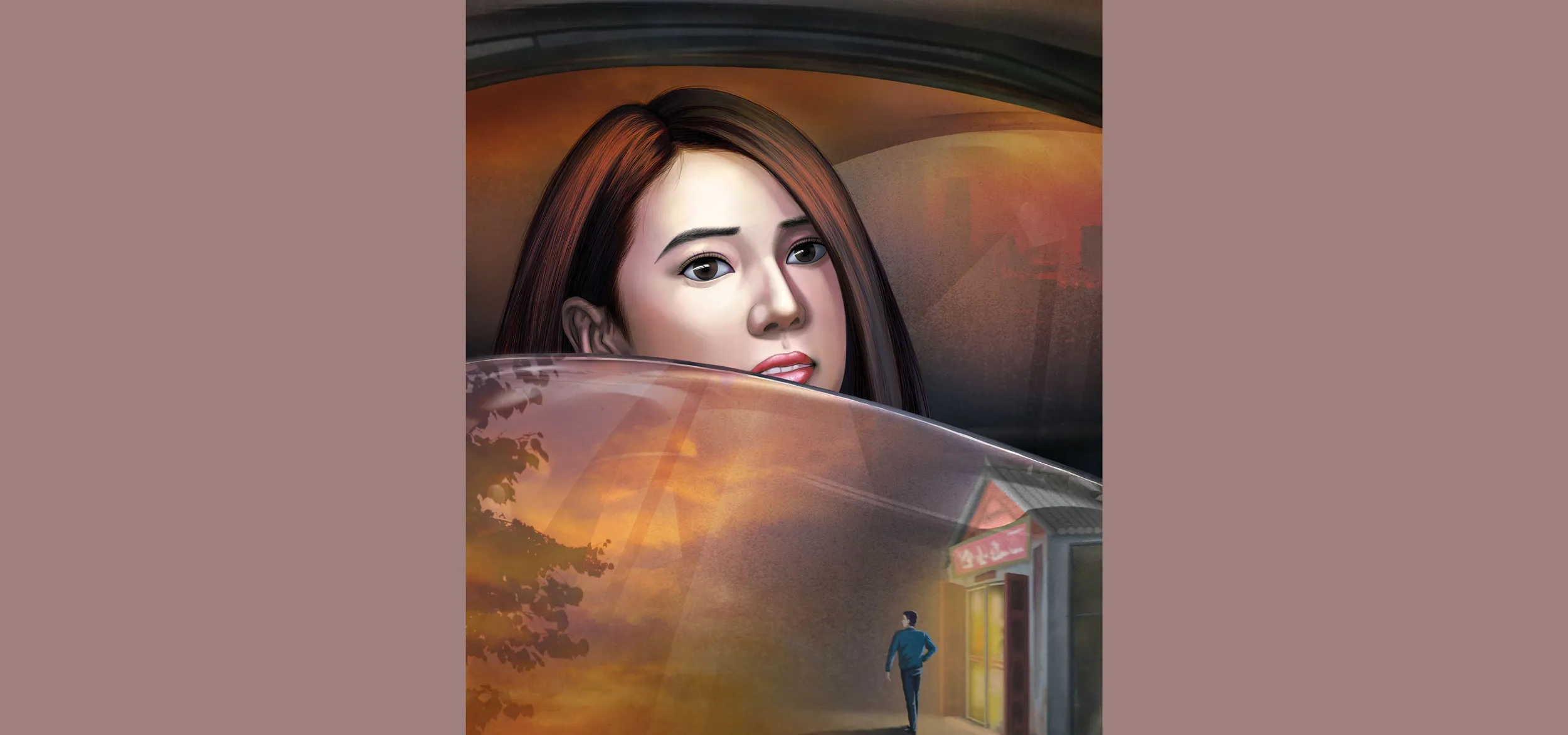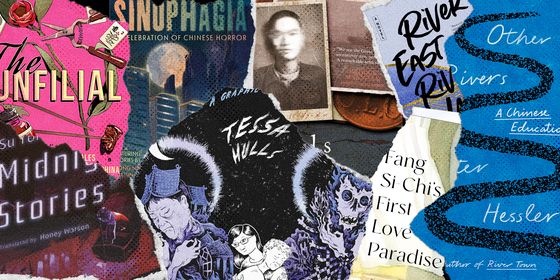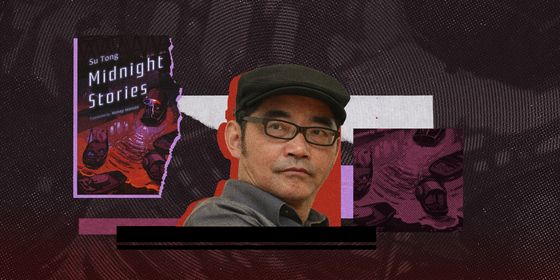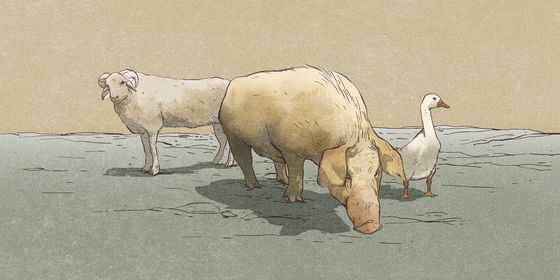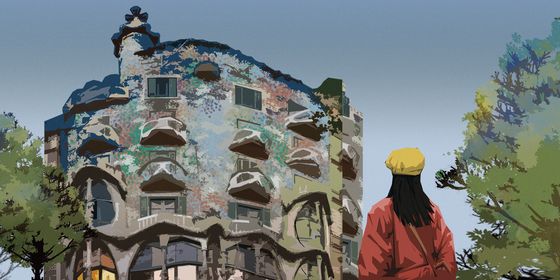An internet celebrity’s return to her hometown
It was a weekday in late September. Through the window, the sky was clear with few clouds, like an over-enhanced desktop background. The car drove smoothly, making a faint vibration that gave one the comfortable feeling like a swaddled baby, or nestling in a lover’s arms. It was a good time for a nap, but Zhu Xiao’ao wasn’t tired.
She sat in the back of the car, the matcha latte in her hand down to its foamy dredges, with a mildly bitter flavor left. From the passenger’s seat, her assistant He Meili took the cup from her and put it in the rubbish bag. This girl, in her early 20s, had signed on just two months ago. She had bright eyes, excelled at both office work and outreach, and was uncharacteristically calm for her age. Come October, Zhu planned to make her full-time.
She’d just gotten her hands on 30 million RMB in capital, and would have a lot of planning to do, but for the time being, she didn’t want to think about it. The trees on the sides of the road were mostly poplars, and between them lay cows, sheep, and people. Most of the landscape was green, but apart from the occasional torch tree that lit the scene up like fire, the colors were fading now. This pastoral scene didn’t seem much different from 20 years before, proving that it’s not things that change, but people. Zhu was quite happy, as if on vacation, but it had become a habit to muse.
She’d graduated from the university 12 years ago, but hadn’t been back since. Every New Year she visited her parents, but though their apartment complex was only a click or two away from the campus, she never thought of going back. Why go back? For what? She didn’t understand those who went to class reunions, and never deigned to do them herself. University was just a way-station in life, no need to look back after you passed it.
But unexpected things happen. A few days ago, Yang Qin, a former classmate who had stayed on to teach at the university, learned that “Cherry Maruko-chan,” the internet celebrity with tens of millions of fans, who’d just published a book, was the same Zhu Xiao’ao. She’d spread the word on WeChat, and after confirming the truth, got the dean to invite Zhu Xiao’ao to give a lecture and book-signing. At first, Zhu refused: Did a teaching university in a small county-level city think it had the credentials to invite her? A number of big-name schools had tried and she’d politely refused them all, saying she had no time. Could coming back lower her status? How would the outside world see this? Even though the school had upgraded to become a satellite campus of a provincial university, it still didn’t deserve her time.
She’d been a cut above her former classmates for a long time, like fish in different ponds. Zhu was quite sure there wouldn’t be anything she’d ever need from them, and they’d have nothing to bond over. She even avoided her relatives if she could help it; she’d rather be thought a failure than lend a hand, whether it was emotional support, money, or help with work.
Yet in the end she accepted the invitation. She was no longer just an internet celebrity; she was a businesswoman, with a company and cultural profile, who couldn’t do just whatever she wanted anymore. There were dozens of livelihoods depending on her continued success. Her management team said she should go—there was nothing to lose, and it’d look bad to refuse: Netizens were apt to be righteous. If a crusading blogger or troublemaker wanted to accuse her of forgetting her roots, this would be the opportunity.
Nothing to lose, though? Getting there and back would waste a day at least, and she was busy, with a whole suite of more important engagements lined up. Still, it was important to look like a woman of the people, so she had He Meili set up a date with Yang Qin.
There weren’t many cars on the road, so they were off the expressway and onto the country road after just over an hour, but here they had to slow down—not only for speed cameras, but also because of traffic. People here didn’t know how to follow regulations. Or maybe they did, but nobody cared, and the police couldn’t go around arresting everyone.
There was a commotion in front of the county’s sole KFC: People dressed in clashing styles, some raising Chinese flags and chanting, others displaying typical red banners with white characters. “Oppose America, Japan, Korea, and the Philippines! Love and respect China! When you eat KFC, you eat American rubbish and disrespect your ancestors!” The crowd ignored Driver Chen’s repeated horn blasts, only grudgingly making way when the car was about to hit them. “I didn’t know your hometown was so patriotic, boss,” Chen quipped.
Zhu thought it was ridiculous too, but wasn’t surprised. Just like the old days, she thought with disdain. “It’s good that we’re driving a German-made Audi, and not a Japanese or American car,” He Meili fretted. “Or they’d turn their spears towards us when we honked at them.”
It made Zhu think of the athletic festival during her second year at university. She’d won the 100-meter race the previous year, and signed up again, not for honor, but because there was a prize of 200 RMB for first place. That would allow her to eat for at least three months without having to ask her family for money, or buy some clothes. Unfortunately, she got her period the day of the race, but the lure of money trumped biology. Not wanting to let down her classmates or professor, she persevered and came in fifth. No one said anything, but they acted noticeably colder, and some said, behind her back, that she hadn’t given it her all, purposely losing face for the class. This was her first taste of the fickleness of the masses, and after that she hardly did any extracurricular activities.
It had just turned 11:30 when they arrived at the campus, and Yang Qin, who’d been at the gate for a while, embraced Zhu upon seeing her. She was almost like a fangirl meeting her idol, squealing: “Oh, it’s like you’ve aged in reverse, I’m already a mother, and you’re still like a young girl!” She smelled of years spent hanging around wood, paint, and books. “Oh, you know, I’m just pretending to be young,” Zhu replied indifferently. “I want to be a mother too, but haven’t found anyone to be the father.”
Yang told Chen where to park, and took Zhu and He into the school’s canteen. “Oh, you’re probably spoiled for choice,” she said without envy. “Guys must be falling all over themselves, left and right.” Zhu smiled distractedly. The campus hadn’t changed much in a decade. “Feeling nostalgic?” Yang asked. “It’s like we were going to class here just yesterday. “Uh, yeah,” Zhu replied, careful not to say anything untoward.
When she’d been a student, Zhu usually didn’t buy a full meal, opting instead for the vegetable-stuffed buns, three for a kuai, or buying leftover dishes at half price for dinner. She’d never been in the canteen’s private rooms, used by students from rich families or the principal’s guests; she hardly even dared to looked at them directly. She’d never thought that more than a decade later she’d be inside one, and as she looked around, felt a slight tinge of pride. She’d been exposed to all manner of fancy foreign food, so this bit of special treatment was nothing new. The only dish that made her nostalgic was the vinegar-soaked noodles made out of bean flour, a local specialty. When they’d graduated, Qian Weiwen had taken her to a noodle house and ordered them. She remembered the incident clearly, because a piece of chive had stuck to her teeth, and she couldn’t loosen it no matter how hard she tried. In the end, she had to bare her teeth to let Qian scrape it off.
After eating, they went to Yang Qin’s dormitory, where there was a bed. Yang asked her if she wanted to rest, but Zhu said she was fine. Yang informed her that the talk would begin at 1:30, and there’d be her speech, which should be under an hour, and then 30 minutes of Q&A, followed by the signing: “The whole thing shouldn’t take much more than two hours; you could be back in Beijing before dark.” As Zhu absentmindedly agreed with the plan, Yang handed her an envelope: the appearance fee.
“No, it’s fine,” said Zhu, refusing. “It’s my alma mater, it’s only right for me to come back—plus I’m promoting my book. There’s no need for me to take the money.”
“It’s from the university, you might as well take it,” Yang persisted.
Judging from the thickness of the envelope, it couldn’t have been more than 2,000 RMB. Zhu continued to refuse it. Yang pretended to be angry. “Oh, so it’s too little for you? Plus, the director asked me to give it to you, so let me do my job.”
Put this way, Zhu couldn’t really refuse, so she passed the envelope to He Meili.
“We’ve still got half an hour,” Yang said, glancing at the time. “Let’s walk around campus, and then go to the auditorium.”
“You’re the boss,” said Zhu.
By the time they had walked two laps around the university’s running track, Yang had volunteered everything she knew about their old classmates, but still hadn’t mentioned Qian Weiwen. He’d been missing from their WeChat group as well: Zhu had opened everyone’s profile picture one by one, and, it quickly transpired that 12 classmates were missing, Qian included. Their home numbers were all out of service; there was no way to track them down, except visit their last address.
Zhu and Qian were from the same hometown, although she’d lived in the village and he in town. They went to the same middle school, but not the same class, and didn’t speak much. But three people in their class had gotten into the university—Zhu, Qian, and Jia Suling. Every Friday after classes ended the three of them would ride their bikes home, and ride back to campus on Sunday afternoon. They met in front of Qian Weiwen’s house, and if they had to wait for anyone he’d invite the other inside to relax for a while. Zhu couldn’t remember how she’d gotten together with Qian; neither specifically made a move, but their relationship started somehow. Jia Suling had dark skin and looked older than her age, though she had big doe eyes. Still, anyone who had a choice would pick Zhu—that much she still believed.
“Looks like you’re the most successful of our class,” Yang was wrapping up. “The others are teaching, or working for other people. At the last reunion everyone seems to have gotten fat, like life had made them prematurely middle-aged.”
Zhu was pulled back to reality. “There’s no point comparing yourself with others,” she replied. “Do what you want to do. It’s most important that you’re satisfied with where you are in life.” This was more or less like the same kind of self-help Chicken Soup for the Soul bullshit that had made her famous. It offered nothing of substance, but was comforting; it helped unsuccessful people feel like they had hope.
“So you say, but seeing you, I feel like I’ve accomplished nothing,” said Yang. “Women should be more selfish, rather than spending all their energy on husbands and children. My husband works at the tax administration, so he’s busy every day. Besides my job, I have to do the laundry, cooking, and take care of my kid. A few years ago we paid off our mortgage, but now we’re about to take out another and buy a two-bedroom place, as we’re afraid prices will keep rising. It’s almost as stressful living here as in a big city!”
Yang was humble-bragging, Zhu realized, but that was fine; she didn’t mind letting Yang indulge her vanity. She tried to inject some envy into her reply: “Oh, it would be so great to have a husband and a child. All I do is work all day, just going to this and that event, so busy I sometimes wish I could have a few more of me to spread the workload; I hardly even made it here!”
“Gotta find a husband,” Yang Qin said happily. “Even powerful women need a man. Still, the single guys I know aren’t great—definitely not up to your standards.”
Zhu casually tucked her hair back behind her ear, revealing a ruby stud that shone like lake water rippling under a breeze. “You think I don’t want to get married?” she smiled. “There’s guys that are interested, but I can never tell if they like me, or my money.”
Yang Qin didn’t know how to respond to this; she had a husband, but not the money to be burdened with this kind of problem. Embarrassed, she said, “Well, you’re better at reading people than I am. I don’t have that kind of skill. At the end of the day, all you need is someone who’s thoughtful, someone who understands your emotions.”
Was Yang showing off again? Zhu read between the lines. She made a point of sounding exasperated: “Of course—those things are the bare minimum! Other than that, let’s not even talk ‘handsome,’ just as long as he looks all right, and we can communicate, and he makes me happy, and you know, we’re compatible in bed, that’s perfect.” She imagined Yang and her husband might not have had a sex life in a long time: If not, why did she look so dried up, like a rag that hadn’t been used in years?
“It’s better in the big city; no matter how high your standards, you can find what you’re looking for,” Yang, seemingly admitting defeat, was bringing the topic to a hasty close. Fortunately, they’d arrived at the multimedia building.
The auditorium had been built just before Zhu graduated, and she’d only been to a few events there. Now there were notices at the entrance about her, with a very yuppie-ish headshot, an introduction to her book, and a short biography. Entering the auditorium, she looked toward the end of the hallway, and stood still for a few seconds. A memory had struck her like a bolt from the blue, as if a cloud had just uncovered the moon.
It was just before graduation, and along with the fragrance of flowers, a mild scent of parting grief was in the air. For those about to leave, all the rules and procedures of the university seemed meaningless. After lights-out, Qian and Zhu stole across the darkened campus to the multimedia building, holding hands all the way to the top of the auditorium. The big, round moon looked like it belonged to the story of Runtu in the Watermelon Patch. The moonlight spilled into the hallway, forming a silver rectangle, in which the shadow of the two lovers lay close together.
She asked him what he planned to do after graduation. Their county was no longer allocating jobs to graduates, meaning they could expect substitute gigs at best. Being a teacher wasn’t what Zhu wanted, but her family wanted her to find a job as quickly as possible, not only to ease their financial burden but also to save up for her dowry. They wouldn’t forgive her if there was an opening and she didn’t take it. This wasn’t the first time she’d asked Qian about his plans, but every time he’d given some half-baked answer about going with the flow, or even joked that going back to the farm wasn’t off the table. This time, she hoped he’d be earnest. She looked at the fine hairs on his face, which made him look young and tender under the moonlight. Something almost maternal welled up in her heart.
“You know, I can’t leave my family,” he said after a slight hesitation. “They need me.” Qian’s mother was an invalid, and his father worked at a concrete factory to support the whole family. But she tried to convince him otherwise: “All the more reason to go out into the world, and after you make a fortune, you can bring your parents to Beijing and get her cured.”
“It’s not that easy to make a fortune,” Qian complained. “And even if I did, my mother might be dead by then.” His tone was defeated, which angered Zhu. “You’re young, you’re full of energy. Why act like a tired old man? If you don’t try to make it happen, you’re going to regret it.” “You can go,” he offered. “Then what about us?” she asked. He didn’t say anything, loosening his arms around her like string being untied from a package. She pushed him roughly, turned, and ran away, hearing her own footsteps like an angry ghost in pursuit.
Before the lecture, the director gave a brief introduction of Zhu’s accomplishments, calling her the pride of the university and adding, in vague and generic terms, how wonderful a student she had been. They smiled at each other. She knew he had no memory of her whatsoever; even her classmates and professors had seen her as a non-entity. She accomplished nothing in those days and came from an average family, with parents who had neither wealth nor title. She had no special talents, didn’t participate in student groups, never won any prizes, wasn’t even a student cadre. None of this mattered now that she was standing here.
The turnout was good; almost no empty seats. Zhu was used to this kind of venue, and the speech was her standard one, modified slightly to suit the day’s audience: How she went from being a white-collar worker to a celebrity, just dwelling on the difficulties enough to cast her accomplishments in a better light .
Zhu Xiao’ao really did go to Beijing after graduation, but spent everything she had in just a few days and, jobless, had no choice but to return home with her tail between her legs. But as luck would have it, a web start-up headquartered in Beijing had set up offices in her county to save money. Zhu got Qian, who hadn’t found a job, to go work there with her. If the company had stuck around, maybe they would have stayed together. Instead, it expanded until the boss closed the county office, and selected his most hard-working, talented employees to take to Beijing. They were both picked, but Qian didn’t go, and this time she didn’t beg. He could stay if he wanted, there was no point in forcing him, the wishy-washy bastard.
Zhu left all this out of her speech, which began with her return to Beijing, jumping between web-related jobs. When WeChat personal brands became popular, Zhu wrote some self-help pablum which gained her a few fans. After that, she opened her own public WeChat account, posted the same kind of lovey-dovey stuff every day: humorous, cheeky, sensitive, emotional pieces promoting personal independence. Her fans were mostly aged 16 and 28, from first and second-tier cities, girls seeking self-improvement and self-actualisation: the “eternal 17.” Her WeChat account alone had more a million followers, and soon a monthly ad revenue to match. She was approached to write books; brands suddenly wanted her as a spokesperson. She’d recently shot a subway ad for a mobile phone game for a seven-figure fee. After that, Zhu told the students, she opened her own company and raised 30 million in capital. With both fame and fortune, her dream had come true.
The Q&A session got off to a rather dry start, with questions on her career and various points raised in her speech. Zhu handled these deftly, but then a boy wearing glasses stood up, laughed awkwardly, and said, “Miss Zhu, may I inquire about something personal?”
“Of course,” she said. This wasn’t a rare occurrence and she had a practiced response. “I think you might be surprised to find I can handle it.”
“Are you single?”
“No.”
“Are you married, then?”
“No—you still have a chance.”
There was some laughter and she felt Yang Qin’s eyes stinging her like a mosquito. She said earlier she was looking for someone, and now she claimed she wasn’t single? She hoped Yang would understand that she was just playing along. The boy’s question had opened the floodgates and now some girl was asking if love and marriage were more important than a career.
“Both are very important. If you are in love, you should give the relationship a shot, and if it lasts, get married,” Zhu spoke with confidence and fervor. “If not, then concentrate on your job and see where things go. Most people can make both happen.” How many boyfriends was it normal to have, the girl persisted. Zhu kept her voice light: “If you end up with your first love happily ever after, you’ve saved yourself the pain of many breakups. And people with too much dating experience may become jaded with the concept of ‘love.’ But if you’re the kind of girl who is going to cry, flail around, and try to hang yourself after a breakup, then just get married as soon as possible.”
She thought of all the men she’d been with over the years. Her longest relationship was right before she was famous. She was building her career and didn’t think it was the right time. Not long after, he married someone he’d known for only two months. Then came a procession of successful men, some a decade or more older than her, others cute boys in their 20s. People didn’t wait for each other, though, and she had a hard time falling in love. All the back and forth made her sick of playing the game. The heart of the girl she once was now only lived in her writing.
After the signing, and the selfies, when the students had finally left, the huge auditorium looked like a graveyard, the seatbacks sticking up like tombstones. Every time an event like this was over, she felt relief as well as loss. The excitement was addictive, after all. Some former professors had bought her book and made chitchat; one history professor wanted tips on new media for her new ad agency.
Now the dean approached, and it seemed he’d been waiting a while. He suggested they have dinner together, and he would arrange a hotel. He was far more hospitable than before. When he mentioned her potential investment in the university, she could see what he was thinking. Before, she was just some writer with a few fans online; only after her address did he realize she was a multimillionaire. But it was too late for that. Nobody had shown up to see her at lunch, and nobody had paid attention when it mattered.
“I’m sorry, but I really can’t. I have other engagements tonight in Beijing,” Zhu smiled politely as she declined. “You’re quite in demand!” the dean remarked, obviously disappointed. “Well, in the future, please come around if you’ve got time; our gate is always open for you.”
“Next time, send a car,” she said, only half-joking. The director’s face tensed before he laughed it off: “No problem!” He and Yang accompanied her to the gate and, just as she was about to get in the car, Yang hugged her again and whispered, as if sharing a juicy secret, “I hear Qian Weiwen is still at his old home.”
At the intersection, the car had to turn right. Zhu, who’d sat silently until then, suddenly barked: “Turn left.” Chen didn’t understand, but didn’t ask questions. “Sure, but I don’t know the way.”
“I’ll tell you. If we go west, we can still get on the expressway, and it’s closer than going east,” Zhu said. There was a pause, and He Meili asked tentatively: “Did you want to see your old home?”
Zhu had sometimes mentioned her birthplace, a beautiful but isolated village by the Blue Spring River to the west, where the roads had only been paved a couple of years previously. Before that, the dirt paths turned to mud whenever it rained. Outsiders couldn’t get in, and insiders couldn’t get out. In the old days when she came home, the drivers at the station would refuse to take her, saying the road was too rough. After three years in Beijing, she’d used all her savings to put a down payment on a modern three-bedroom house in this county, and moved her parents there so that she wouldn’t have to go to the village anymore; that was now “home.”
Zhu nodded slowly. Even she wasn’t sure why she had made Chen change direction, but Yang’s comments had planted a seed in her mind. Maybe after all these years she was afraid to find out what was going on with Qian. Maybe that’s why she moved her family, so that she wouldn’t have to worry about running into him, or hearing news of him. Maybe the reason she’d become obsessed with earning money was so she could show him, that he could one day see all she’d achieved and how happy she was—not like that day she’d boarded the slow train to Beijing, watching the indifferent look in his eyes, the silhouette of his back disappearing on the platform.
The road was clear, and after 20 minutes they’d already passed through three towns. Linxi town lay only a little way ahead, where Qian Weiwen still lived, if Yang’s information was correct. What did he do for a living? Probably not teaching; most of their classmates hadn’t stayed in the profession long. Jia Suling had been one of them, then joined the local porcelain boom, becoming an accountant at one of the factories. But, like the small coalmines in Shanxi, the porcelain boom was short-lived, and soon only two or three struggling factories remained. But Qian was too straitlaced to go into business, didn’t have it in him to cheat his way to the top in a place like this. Maybe he worked at the concrete plant like his father. Zhu was seized with the painful thought of her former lover, roughened, buckling under the weight of heavy bags of cement.
By now they’d arrived at the main road through Linxi. Zhu told Chen to slow down, so she could see the town clearly. The place had actually changed a bit, with the dark-tiled houses resurfaced, even a few new two-story buildings. There were more stores than before, with tacky signs like “Come Again Dumpling Shop,” “A-Jun’s Hair Salon,” all closed. The street was deserted like Beijing at midnight, everything looking smaller than she remembered; even the road seemed shorter. Though they drove at a crawl, they were already near the far western end of the road when Zhu ordered Chen to stop.
She lowered the window, and a bitingly cold wind blew dust into the vehicle. She sniffed but couldn’t sneeze. The air was as dry as she remembered. “Is this where you grew up?” He Meili asked. “It’s not what I pictured.” “Well, it wasn’t always like this,” responded Zhu. She wondered if it would be too much to actually drive to Qian’s street: If she ran into him, would it look like she was looking for him? How would he react?
Just when she’d decided to abandon the idea, He said: “I need to use the toilet…my stomach doesn’t feel good.”
Across the street was a brick building, an outhouse that probably belonged to the nearby clothing factory, with “Man” and “Woman” daubed on its concrete wall. Zhu got out to wait, and looked across at a small store where a girl of 7 or 8 was playing with a balloon on a string. Zhu remembered a peddler’s market behind the shop. On the fourth and ninth of each lunar month, it was packed with people selling fruit, vegetables, fish, meat, and everyday essentials. She’d gone one time with Qian, and he’d bought her a pair of red leather shoes—actually, they were pleather.
A familiar silhouette suddenly crossed her view. Though stockier than before, dressed differently from how she remembered, she instantly saw it was Qian Weiwen. He stopped his e-bike in front of the store, and walked in carrying a large braided sack.
The little girl let go of the balloon, letting it fly away as she made a beeline after Qian, yelling, “Daddy!” After a short while, Qian emerged, daughter in arms, as they went chasing after the balloon. Zhu’s eyes were hot, but she couldn’t walk over, could only stand there and stare. When Qian turned in her direction, she turned around, and when she turned back a woman was just coming out the store. The woman got on the e-bike and it beeped twice. “Mama!” cried the girl, as Qian picked her and placed her on the back seat. The bike drove towards Zhu, heading north. As the woman’s face flashed before her, Zhu almost cried out—wasn’t that Jia Suling?
Darker—plumper—her doe eyes no longer quite so dewy. But she had married Qian Weiwen, and they had a child.
He Meili was finished, and Chen was now pouring out bottled water to wash her hands beside the road, but Zhu Xiao’ao was still unable to move, eyes fixed upon the small store. Qian looked over at her, and she felt like she was on fire. Then his eyes swept past like a pair of headlights, and he returned to the store.
Realizing Qian’ gaze had been following his wife and daughter, Zhu dove into the car, voice trembling slightly as she practically ordered Chen to drive.
They were back on the expressway within a quarter of an hour. Gradually, some color came back to Zhu’s papery complexion. The sun set brilliantly red as the car drove on, everything soaked in a layer of orange. She looked into the rear-view mirror, at the road that stretched behind them like shed skin.
Author’s Note: To summarize the web celebrity’s experience in a sentence—their hometown is a place they can never return. Of course, this is not in a physical sense. There are three meanings here: First, with rapid urbanization, when you have been away for years, your hometown never stays the same as in your memory. When returning, you are unable to locate the old traces. Second, people who have been toughened by living in the city are transformed into new individuals without even realizing it. Their habits, values, and outlook are no longer compatible with small-town thinking. No matter if it’s in lifestyle or culture, there will exist a large gap between them and their friends from the old times. There’s now essentially nothing in common between the two groups. Thirdly, it refers to a spiritual return. Hometown is merely a symbol of childhood. Times are always changing and everyone has to adapt. In this sense, no one can simply retreat back to a peaceful childhood.
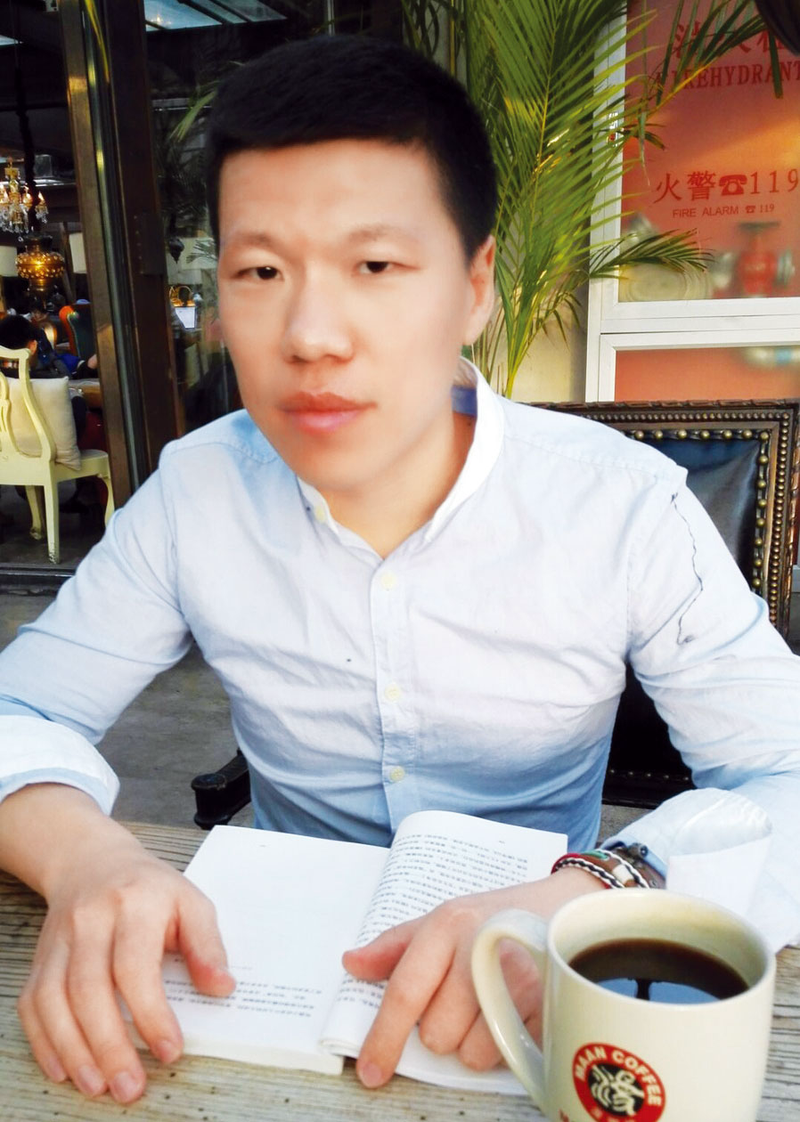
Author: Jiao Chong (焦冲)
Born in 1983 in Yutian, Hebei province, Jiao began to write in 2008. His work focuses on the multiple aspects of urban life, the anxieties of city dwellers, and their emotional world. He captures the conflicts that arise from people of all backgrounds and varied walks of life, sharing different values and views, living together. Jiao has published a series of novels, including Men in Their 30s (《男人三十》) and Micro Life (《微生活》). His short fiction has been published in Dangdai, People’s Literature and Shanhua and other top literary magazines. Jiao currently lives in Beijing, working in new media.
Homecoming Queen is a story from our issue, “Beyond Go.” To read the entire issue, become a subscriber and receive the full magazine.





